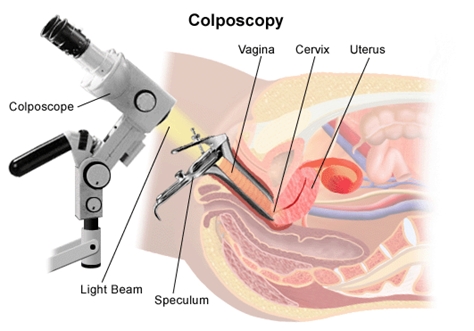What is a colposcopy?
A colposcopy is an outpatient procedure to view the cervix and the vagina through a high-powered microscope called a colposcope. The colposcope looks like a pair of binoculars attached to a stand. It does not enter the vagina. Direct examination through the colposcope allows the detection of abnormalities on the cervix that can not be seen with the naked eye.
Is There Any Preparation for the Test?
We suggest that one hour before your appointment you take a non-steroidal anti-inflammatory medication such as Ibuprofen or Naproxen Sodium. Make your appointment for a time when you will not be menstruating (on your period). Refrain from intercourse, the use of spermicidal jelly, vaginal medications, douches, or tampons for at least 24 hours before the procedure as they can interfere with the accuracy of the test.

How is the Examination Performed?
You will lie on the examining table with your feet in the stirrups, just like a regular pelvic exam. Your doctor will use a speculum to separate the walls of the vagina, just like during a normal Pap test. The speculum will remain in the vagina throughout the procedure, causing you to feel a little pressure.
A vinegar solution (called acetic acid) will be applied to the cervix to remove mucous and debris. The colposcope will be placed near the vaginal opening. Your doctor will be able to see your vagina and cervix under magnification.
Any areas showing abnormal cells will be biopsied. In a biopsy, a tiny sample of tissue will be removed from the area with a tweezer-like instrument. An endocervical scraping from the os (the opening in the middle of the cervix) may be taken as this is often where abnormal cells begin. You may feel a pinch or cramping when the tissue samples are taken. The samples will be sent to a pathology lab to be examined.
What Should I Expect After the Procedure?
If a biopsy was taken, you may have slight bleeding or spotting for a few days following the procedure. Additionally, you may notice a coffee ground or mustard-like discharge. This is normal. You may use pads, but no tampons for one week following the procedure. You should also refrain from douching or having sexual intercourse. If you have any cramping after the procedure, you may continue the Ibuprofen or Naproxen Sodium for relief.